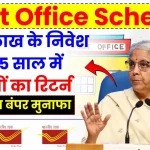
Investing your hard-earned money in a secure and profitable scheme is crucial for financial stability. Among the safest investment options available in India, Fixed Deposits (FDs) and Recurring Deposits (RDs) stand out as popular choices. But which one is more beneficial? Whether you are a seasoned investor or someone new to the world of savings, understanding the key differences between these two deposit schemes will help you make the right decision.
Fixed Deposit vs. Recurring Deposit
| Feature | Fixed Deposit (FD) | Recurring Deposit (RD) |
|---|---|---|
| Investment Type | One-time lump sum deposit | Monthly deposits |
| Interest Rate | 6% – 8.5% p.a. (varies by bank and tenure) | 4.75% – 8.5% p.a. |
| Best For | Investors with lump sum savings | Systematic investors |
| Tenure | 7 days to 10 years | 6 months to 10 years |
| Liquidity | Low to medium (penalty on premature withdrawal) | Moderate |
| Tax Implications | TDS applicable on interest earned beyond Rs. 40,000 (Rs. 50,000 for senior citizens) | Similar TDS rules apply |
| Safety | Highly secure (up to Rs. 5 lakh insured under DICGC) | Same level of safety |
Both Fixed Deposits (FDs) and Recurring Deposits (RDs) offer safe investment avenues with guaranteed returns. The right choice depends on your financial goals—FDs are ideal for lump sum investments with higher returns, while RDs are perfect for systematic monthly savings. Before investing, always compare interest rates, penalties, and tax implications across banks to make the most informed decision.
Understanding Fixed Deposits (FDs)
A Fixed Deposit (FD) is a financial instrument where you deposit a lump sum amount with a bank or financial institution for a fixed period at a predetermined interest rate. The interest is either compounded quarterly and paid at maturity or offered at regular intervals (monthly/quarterly) for income purposes.
Advantages of Fixed Deposits
- Higher Interest Rates: FDs generally offer better interest rates compared to savings accounts.
- Flexible Tenure: Ranges from 7 days to 10 years, allowing customization based on financial goals.
- Guaranteed Returns: The interest rate remains fixed throughout the tenure, protecting against market fluctuations.
- Loan Against FD: You can avail loans up to 90% of your FD value.
- Tax Benefits: Some FDs qualify for tax-saving benefits under Section 80C (5-year lock-in period required).
Who Should Choose an FD?
FDs are best suited for:
- Individuals with lump sum savings looking for safe investment options.
- Retirees or pensioners seeking regular income through interest payouts.
- Risk-averse investors who prioritize security over high returns.
see also: Special FD Schemes: Amrit Kalash, Utsav and Amrit Varshi?
Understanding Recurring Deposits (RDs)
A Recurring Deposit (RD) allows investors to deposit a fixed amount every month for a predetermined period, earning interest similar to FDs. It is ideal for those who want to build a savings habit systematically.
Advantages of Recurring Deposits
- Encourages Saving Discipline: Requires monthly contributions, making it ideal for salaried individuals.
- Flexible Tenure: Ranges from 6 months to 10 years, allowing adaptability based on financial goals.
- Good Returns: Offers interest rates comparable to FDs.
- Safe and Secure: Insured under DICGC up to Rs. 5 lakh.
- Loan Facility: Some banks allow loans against RDs, usually up to 80-90% of the deposit value.
Who Should Choose an RD?
RDs are best suited for:
- Young professionals and salaried employees looking to save systematically.
- Individuals with irregular or small earnings who cannot afford lump sum investments.
- Parents saving for child education or short-term financial goals.
FD vs. RD: A Practical Comparison
Let’s say you have Rs. 1,20,000 to invest. Here’s how the returns would compare in an FD and RD:
Scenario 1: Investing in FD
- Deposit Amount: Rs. 1,20,000 (one-time)
- Interest Rate: 7.5% p.a.
- Tenure: 1 year
- Maturity Amount: Rs. 1,29,000 (approx.)
Scenario 2: Investing in RD
- Monthly Deposit: Rs. 10,000
- Interest Rate: 7.5% p.a.
- Tenure: 1 year
- Maturity Amount: Rs. 1,24,700 (approx.)
As seen above, FDs provide slightly higher maturity returns due to upfront investment, whereas RDs distribute deposits across the tenure, leading to a lower total interest earned.
see also: Deposit this much money in just 5 years to get ₹8,28,252
Which One Should You Choose?
Go for FD if:
- You have a lump sum amount ready to invest.
- You need higher interest earnings.
- You prefer fixed returns with liquidity in case of emergencies.
Go for RD if:
- You want to build savings systematically.
- You have a regular monthly income.
- You need a short-term savings option without locking in large funds.
Fixed Deposit vs. Recurring Deposit FAQs
1. Can I withdraw my FD or RD before maturity?
Yes, but premature withdrawal of an FD or RD incurs a penalty ranging from 0.5% to 1% of the applicable interest rate.
2. Is FD or RD better for tax savings?
FDs with a 5-year lock-in period qualify for tax deductions under Section 80C, while RDs do not. However, both FD and RD interest earnings are taxable.
3. Which banks offer the best FD and RD interest rates in 2025?
Currently, leading banks like HDFC, ICICI, and SBI offer FDs with interest rates up to 7.40% and RDs up to 7.25%. Check with individual banks for the latest rates.
4. Is my money safe in an FD or RD?
Yes, both FDs and RDs in scheduled banks are insured up to Rs. 5 lakh under DICGC (Deposit Insurance and Credit Guarantee Corporation), ensuring security for small investors.
5. Can I open multiple FDs or RDs?
Yes, you can open multiple accounts with different tenures and banks to diversify investments and maximize returns.











